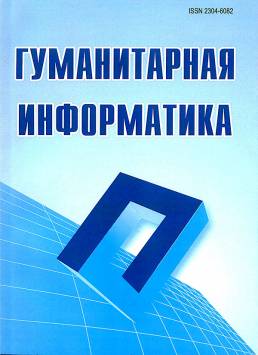ACTUAL PSYHOLOGICAL PROBLEMS OF CYBER-ETHICS
The article is devoted to discussion of the newest tendencies in cyber-ethics, its interrelations with psychology and practice of education. The problem of training of Internet - users of new generations to bases of cyber-ethics is put. Its main task will be to adapt traditional system of moral judgments for conditions of anonymous application of the Internet.
Download file
Counter downloads: 320
Keywords
Authors
| Name | Organization | |
| Vojskunskij A.E. | ||
| Naftuljev A.I. |
References
Анцыферова Л.И. Связь морального сознания с нравственным поведением человека (по материалам исследований Лоуренса Колберга и его школы) // Психологический журнал, 1999. Т. 20, № 3. С. 5-17.
Kohlberg L. The Meaning and Measurement of Moral Development. Clark Univ. Press, 1981.
Войскунский А.Е. Психологическая характеристика потенциально негативных последствий применения компьютерных технологий // Молодежь в компьютерно-игровых и интернет-центрах: Сборник методических материалов (по итогам работы круглого стола). М.: АРКЦентр, 2004. С. 33-37.
Бондаренко С.В. Социальная структура виртуальных сетевых сообществ. Ро- стов н/Д., 2004.
Бондаренко С.В. Киберэтика и сетевые сообщества (молодежный аспект проблемы, с точки зрения американских социологов и психологов) // Социальные и психологические последствия применения информационных технологий: Мат-лы международной Интернет-конференции / Под ред. А.Е. Войскунского. М., 2001. С. 243-252.
Бабаева Ю.Д., Войскунский А.Е. Одаренный ребенок за компьютером. М.: Сканрус, 2003.
Schwartau W. Internet & Computer Ethics for Kids (and Parents&Teachers Who Havent Got a Clue), Inter-Pact, 2001.
Wortuba T.R. A Comprehensive Framework for the Analysis of Ethical Behavior, with a Focus on Sales Organizations // Journal of Personal Selling and Sales Management. 1990. 10(1). Р. 29-42.
Bommer M., Gratto C., Gravander J., & Tuttle M. A Behavioral Model of Ethical and Unethical Decision Making // Journal of Business Ethics. 1987. 6. Р. 265-280.
Suler J.R. & Phillips W. The Bad Boys of Cyberspace: Deviant Behavior in Multimedia Chat Communities. CyberPsychology and Behavior. 1998. 1. Р. 275-294. www.rider. edu/ ~ suler/psycyber/badboys.html <http://www.rider. edu/ ~ suler/psycyber/badboys.html>
Voiskounsky A.E. & Smyslova O.V. Flow-Based Model of Computer Hackers' Motivation. CyberPsychology & Behavior. 2003. 6(3). Р. 171-180.
Shinder D.L. & Tittel E. Scene of the Cybercrime: Computer Forensics Handbook, Syngress Media Inc., 2002.
Rodgers M. A new hackers' taxonomy, Dept. of Psychology, University of Manitoba, 1999. www.mts.net/~mkr/hacker.doc <http://www.mts.net/~mkr/hacker.doc>
Войскунский А.Е., Смыслова О.В. Роль мотивации потока в развитии компетентности хакера // Вопросы психологии. 2003. № 4. С. 35-43.
Sterling, B. The Hacker Crackdown: Law and Disorder on the Electronic Frontier. London: Penguin, 1992.
Taylor P. Hackers. Crime in the Digital Sublime, London: Routledge, 2002.
Nicholson L.J., Shebar T.F. & Weinberg M.R. Computer crimes. American Criminal Law Review, 2000. www.albany.edu/acc/courses/acc680.spring2001/curtin101.ppt <http://www.albany.edu/acc/courses/acc680.spring2001/curtin101.ppt>
Войскунский А.Е., Петренко В.Ф., Смыслова О.В. Мотивация хакеров: психосемантическое исследование // Психологический журнал. 2003. Т. 24, № 1. С. 104-118.
Ang A.Y. & Lo B.W.N. Software piracy attitudes of tertiary students in Australia, 2001. www.hkcs.org.hk/searcccd/ed11_aa.htm <http://www.hkcs.org.hk/searcccd/ed11_aa.htm>
Whitman M.E., Townsend A.M. & Hendrickson A.R. Cross-national differences in computer-use ethics: A nine-country study. Journal of International Business Studies, 30(4), 1999. Р. 673-687. <http://copenhagen.jibs.net/Archive/1999/30_4_99_673.pdf>
Voiskounsky A.E., Babaeva J.D. & Smyslova O.V. Attitudes towards computer hacking in Russia, eds. D. Thomas & B. Loader, Cybercrime: Law Enforcement, Security and Surveillance in the Information Age, L. & N.Y.: Routledge, 2000. Р. 56-84.
Kim K.H. A study of the conduct of Korean IT participants in ethical decision making, eds. C.-H. Chung, C.-K. Kim, W. Kim, T.-W. Ling & K.-H. Song, Web and Communication Technologies and Internet-Related Social Issues - HSI 2003. Proc., Second International Conference on Human.Society@Internet (Seoul, Korea, June 2003). Lecture Notes in Computer Science, 2713, Berlin et al.: Springer. 2000. Р. 64-74.
Ruf B.M. & Thomas S.B. Unethical decision-making with computer usage in a university environment, 2003. <http://aaahq.org/AM2003/EthicsSymposium/Session%205a3.pdf>
Debnath N. & Bhal K.T. Religious belief and pragmatic ethical framework as predictors of ethical behavior, eds. F.Sudweeks & Ch.Ess, Cultural Attitudes towards Technology and Communication. Proceedings of the 3rd International Conference (Montreal, Canada, 12-15 July, 2002), 2000. Р. 409-420.
McGuire Sh., D'Amico E., Tomlinson K. & Brown S. Teenagers self-reported motivations for participating in computer crime, 8th International Conference on Motivation (Workshop on Achievement and Task Motivation). Abstracts. Moscow, 2000. Р. 72-73.
Panteli A. Code Confidential: Codes of Practice for Computing Professionals. ACM SIGCAS Computers & Society. 2000. 32(6). www.computersandsociety.org/ AccessController/sigcas/subpage/sub_page.cfm?article=844&page_number_nb=1 <http://www.computersandsociety.org/AccessController/sigcas/subpage/sub_page.cfm?article=844&page_number_nb=1>
Mason R.O., Mason F.M. & Culnan M.J. Ethics of Information Management. Thousand Oaks, CA: Sage Publ., 1995.
Cronan T. P. & Kreie J. Making ethical decisions. Communications of the ACM. 2000. 43(12). Р. 66-71.
Rest J.R. & Narvaez D. Moral Development in the Professions: Psychology and Applied Ethics, Mahwah, N.J.: Lawrence Erlbaum, 1994.
Jamal K. & Bowie N.E. Theoretical Considerations for a Meaningful Code of Professional Ethics. Journal of Business Ethics. 1995. 14. Р. 703-714.
Hudson, J.M. & Bruckman A. "Go Away": Participant Objections to Being Studied and the Ethics of Chatroom Research. The Information Society, 20(2), pp. 127-139, 2004.
Frankel M.S. & Siang S. Ethical and Legal Aspects of Human Subjects Research on the Internet: A Report of a Workshop June 10-11, 1999. American Association for the Advancement of Science (AAAS), 1999. www.aaas.org/spp/dspp/sfrl/projects/intres/report.pdf <http://www.aaas.org/spp/dspp/sfrl/projects/intres/report.pdf>
Buchanan E.A. (ed.) Readings in Virtual Research Ethics: Issues and Controversies. Hershey, London, Melbourne, Singapore: Information Science Publishing, 2004.
Spinello R.A. & Tavani H.T. (eds.). Readings in CyberEthics. 2001, Jones and Bartlett Publ.
Whine M. Far right extremists on the Internet, Cybercrime: Law Enforcement, Security and Surveillance in the Information Age, eds. D. Thomas & B. Loader 2000. L. & N.Y.: Routledge. Р. 234-250.
Rotenberg M. Protecting Human Dignity in the Digital Age, Infoethics 2000. Ethical, legal and Societal Challenges of Cyberspace. Third International Congress. UNESCO Headquarters, Paris, France, 13-15 November, 2000. Final Report and Proceedings. webworld. unesco. org/infoethics2000/report_151100.html#rotenberg <http://webworld.unesco.org/infoethics2000/report_151100.html#rotenberg>
Langford D. (ed.). Internet Ethics, Houndmills et al. 2000, Macmillan Press.
Grodzinsky F.S. The development of the 'ethical' ICT professional and the vision of an ethical on-line society: how far have we come and where are we going? ACM SIGCAS Computers and Society. 30 (1). 2000. Р. 3-7.
